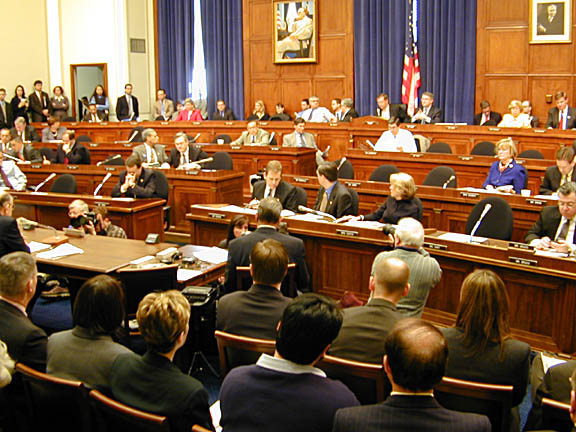WASHINGTON — Attendance at committee meetings – the basic work of Congress – often surfaces as an issue in congressional campaigns. But political experts say campaign ads that solely highlight attendance records are missing the mark.
In Iowa this year, candidates looking to fill Tom Harkin’s seat in the U.S. Senate have lobbed accusations back and forth about poor attendance. Both Democrat Bruce Braley and Republican Joni Ernst have seen their records questioned when it comes to showing up for scheduled hearings – Braley on Capitol Hill; Ernst at the Statehouse in Des Moines.
“It is a misguided target more often than not,” said Norman Ornstein, congressional scholar at the American Enterprise Institute. “It is typical at hearings to have a handful of members, sometimes only a chair and maybe a member of the minority.”
Ornstein said that often members come to hearings for a few minutes and then leave. And when lawmakers do show up, it could be just to be marked down as “present,” according to another political expert, Nathan Gonzales of the Rothenberg Political Report.
“They come in for their time, ready to question witnesses, [but] they don’t stay for the whole time,” Gonzales said.
Some committees don’t even keep raw data of attendance. For some panels, it’s possible to see which members were present by combing through transcripts maintained by the Government Printing Office.
But spotty attendance can come back to haunt candidates – and not just in Iowa. Committee participation is a hot button in other close Senate races in North Carolina and Colorado. Yet while candidates hammer away at the issue at home, Washington analysts say empty seats in committee rooms are common on Capitol Hill.
Out of 26 members on the Veteran Affairs Committee that Braley served on in 2011-12, eleven were absent for more than 50 percent of full committee hearings, with only the chairman in perfect attendance, according to Politifact.
Most House members and senators serve on two or three committees and also have several subcommittee assignments, Ornstein said.
“No one has 100% attendance at committee hearings, because they [panels] overlap and members have multiple subcommittee assignments,” Ornstein said in an email exchange.
A TV ad run by a group called Concerned Veterans for America, funded by the Koch brothers, criticized Braley for missing over 75 percent of the hearings of the House Veterans Affairs Committee meetings in 2011-12. Ernst echoed this criticism in the first televised Iowa senate debate in September.
Braley’s campaign released a statement that called the ads misleading, and said the lawmaker had a record of delivering results for Iowa veterans. Braley, a Waterloo attorney, also served on the Veterans Affairs’ subcommittee on economic opportunity from 2011 to 2012, and was present for 15 out of 17, or 88 percent, of those hearings, according to Politifact.
During the current session in Washington, the four-term congressman is serving on the wide-ranging Energy and Commerce Committee. Braley was marked present for 14 out of 88 Energy and Commerce hearings in 2013, missing nearly 84 percent, according to General Printing Office transcripts of the panel’s meetings.
When asked to respond to Energy and Commerce attendance, Braley’s campaign pointed to his attendance at committee markups — where legislation is debated and voted on. From 2007 to 2014 Braley missed only 11 percent of committee markups, Braley’s campaign said, citing Congressional Quarterly.
“Bruce always puts Iowa first,” his campaign said.
Ernst, a lieutenant colonel in the Iowa Army National Guard, does not have a perfect attendance record in the Iowa Senate. She missed nearly 40 percent of the votes in the state Senate during 2014, as well as large number of committee meetings, according to state records reported by Politico, a Washington-based newspaper and website.
The Ernst campaign fired back against the reviews. “Joni Ernst has a great attendance record, making almost 90 percent of the votes during her time in the state Senate while also serving her nation in the Iowa Army National Guard,” said Gretchen Hamel, campaign spokeswoman for Ernst. The information provided by the Ernst campaign reflects Iowa Senate floor votes, not committee hearings.
In Washington, in the heat of a congressional session, dozens of hearings can be on tap on a given day. Some attendees target sessions based on media opportunities.
“Lawmakers rarely attend all of their committee hearings, unless they think the issue will command public attention,” said Sarah Binder, a political science professor at George Washington University and senior fellow at the Brookings Institution.
Partisanship in the House, which is under Republican control, might also have an effect on attendance.
“For members of the minority, where your role is more limited, there is even less incentive to attend from beginning to end,” Ornstein said.
Despite uncertainty over who went to which hearing , the subject could still resonate with Iowa voters on election day.
“There might be an explanation for why a senator misses committee hearings but that doesn’t mean that voters are going to accept it,” Gonzales said.
<!--CEDAR POINT GAZETTE BEGINS HERE--> <hr /> <p style="vertical-align: middle;">Published in conjunction with <a title="CEDAR POINT GAZETTE" href="http://www.thegazette.com/" target="_blank"><img class="alignnone" style="vertical-align: middle;" alt="Cedar Point Gazette Logo" src="https://dc.medill.northwestern.edu/wp-content/uploads/2014/09/cedar-rapids-gazette-logo-trans.jpg" /></a></p> <!--CEDAR POINT GAZETTE ENDS HERE-->


